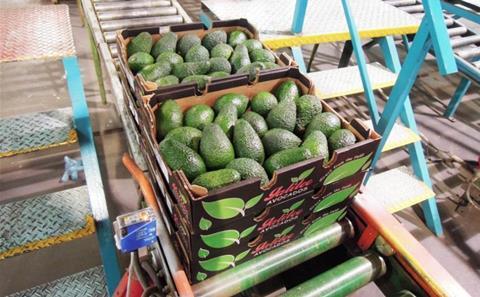Following a disappointing campaign in 2023, Israeli avocado producers have welcomed a big rise in production this year, with efforts ongoing to develop new export markets

Many new avocado orchards have been planted in Israel in recent years, even near Gedera, south of Tel Aviv, avocado orchards have been appearing among the plantations of pomegranate and citrus.
Official figures show that there were 4,000ha of avocados planted in Israel in 2004, 7,000ha in 2014, rising to 9,600ha by the end of 2018. Planting has slowed down to 500-600ha a year in recent years, with current cultivation at 14,300ha.
After an all-time record yield of 210,000 tonnes in 2022, the disappointing 2023 harvest totalled about 150,000 tonnes, mainly due to adverse weather conditions. However, this year’s yield is expected to be close to 250,000 tonnes, an annual increase of 60 per cent.
There are two major producing cooperatives, Galilee Exports and Granot Fresh. Three packing houses exclusively supply Galilee Exports, growing on a total of 6,500ha. They are Milopri, situated on the coast, north of Haifa, and covering production from Western Galilee; Zemach, which is located at the southern end of the Sea of Galilee, covering production areas around the sea and southwards into the Jordan Valley; and Avocado-Gal, situated in the Upper Galilee.
Granot Fresh, based on the coastal plain in the centre of the country, is part of Granot, Israel’s largest cooperative belonging to 43 kibbutzim, and grows about 3,200ha of avocados. In addition, there are a number of smaller packing houses affiliated to other exporters.
Around half of Israel’s avocado production is exported, with a similar quantity sold locally. In recent years, per capita consumption in Israel has increased from 8kg per year to 12kg.
The two major exporters – Galilee Exports and Granot Fresh (established only four years ago) – cover about 70 per cent of total exports. Mehadrin exports a further 14 per cent.
The most popular variety, Haas, represents about 60 per cent of exports, with Galilee Exports one of the largest exporters of the variety in the world.
The green-skinned varieties – led by Ettinger and Pinkerton – make up about 40 per cent of exports. Galilee Exports sends green-skin varieties mainly to Poland and Russia. Mehadrin exports to a wide range of markets, while other green-skinned varieties exported are Fuerte, Arad, Galil and Reed.
Although most of the exported crop from Israel (80 per cent) is bound for Europe, this represents only about 25 per cent of total European avocado imports, with big competition from Morocco, Spain and Chile. Efforts are ongoing to develop new markets worldwide, including the Far East.
Galilee Exports has recently invested in Peru, controlling about 100ha of avocados, with 1,200 tonnes produced. This quantity is to be delivered to Galilee customers at a time when avocado exports from Israel are winding down.
There is a slow but steady increase in the concept of ready-to-eat avocados on the shelves. The fruit is treated in a highly controlled atmosphere – in special ripening rooms – with various combinations of warm air and natural gases (such as ethylene) to ripen the fruit immediately prior to retail display.
The introduction of precision irrigation in plantations has succeeded in optimising yields. On the one hand, avocados have a wide and shallow root zone with very low drought tolerance while, on the other hand, the tree shows a high sensitivity to flooding or over-irrigation.



